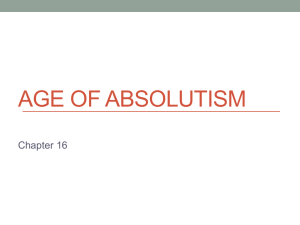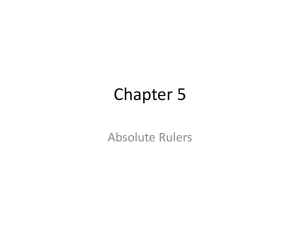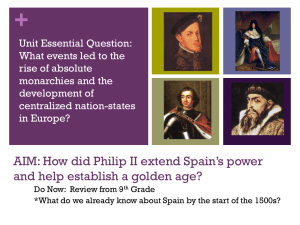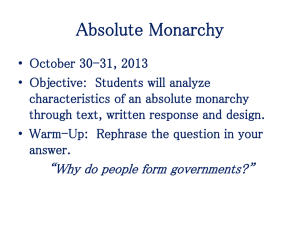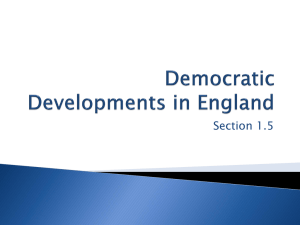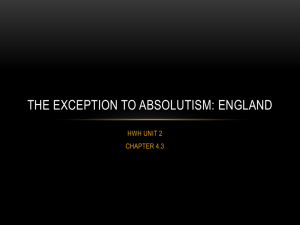Absolute Monarchs Revised
advertisement
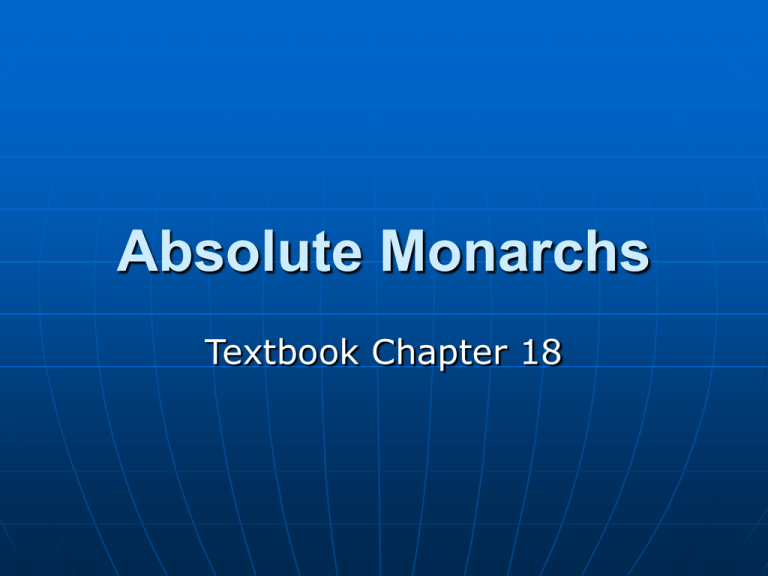
Absolute Monarchs Textbook Chapter 18 The Power of Spain: Main Idea Spain experienced a golden age during the 1500s Economic problems and military struggles decreased Spanish power by the 1600s The King Becomes Emperor 1516 - King Charles I becomes king of Spain Rules as ABSOLUTE MONARCH Absolute monarchs have divine right and may not be challenged In Spain, Charles struggled to control empire Charles V and the Empire How might being both King of Spain and the Holy Roman Emperor create difficulties for Charles? 1519 – throne of Holy Roman Empire vacant, King Charles I becomes Holy Roman Emperor Charles V Charles V and Religion Wants all of Europe to be Catholic • 1521 – confronts Martin Luther • Rebellions against Catholic rulers spread • Charles V is forced to sign Peace of Augsburg Martin Luther Dividing the Empire 1556 – Charles V gives up throne Ferdinand Splits empire between brother and son • Brother – Hapsburg holdings in Austria • Son – Netherlands, Spain, Sicily, Spain’s colonies Philip Thinking Questions In what ways was Charles the V a successful emperor? In what ways was he unsuccessful? Spain Under Philip II Spain at peak of grandeur Marries Queen Mary I of England No heir 1560s – Calvinist Protestants in northern Low Country provinces revolt Dutch Revolt Philip II sends Duke of Alba with army to punish Dutch • Court of Blood tortures and executes rebels Revolt continued until 1609 Spain and England English aid Dutch – both Protestant English sea dogs attack Spanish ships King Philip II decides to invade England Sir Francis Drake Spanish Armada Naval fleet assembled to attack England Queen Elizabeth I is prepared for attack An Empire in Decline Spain recovers from Spanish Armada, but still has internal problems • Gov’t not centralized – Philip trusts nobody • Wealth from America on war • Philip borrows lots of money, goes into bankruptcy 4 times Thinking Question What were 2 events that caused problems for Spain? What effects might bankruptcy have on the development of Spain? Absolute Monarchy in France: Main Idea Henry IV, Louis XIII, and Louis XIV strengthened the French monarchy Louis XIV set the example of an absolute monarch for the rest of Europe Religious War and Henry IV John Calvin 1560s – 1 in 10 French = Huguenots • Threat to Catholic French monarchy • “one king, one law, one religion” • Religious conflict was challenge to absolute monarchy Conflict and New King St. Bartholomew Day Massacre ordered by Queen Catherine de’Medici • 70,000 Huguenots killed Henry of Navarre escapes death by denying religion • 1593 – coverts to Catholicism • Becomes King Henry IV Compromise and Progress 1598 - Edict of Nantes • Gives Huguenots limited freedom of worship – no longer need to follow religion of king • Catholicism is still official religion Henry focuses on repairing war-torn country Thinking Question What were some of the high points and low points in the life of Henry IV? Louis XIII and Richelieu Louix XIII 1610 – Henry IV murdered, son Louis XIII crowed Cardinal Richelieu = right-hand man • Reduce power of Huguenots and strengthen monarchy • Cuts off supplies to port city of La Rochelle Threat from Nobles Louis XIII and Richelieu suppress nobles • Richelieu’s spies uncover series of secret planned revolts • Punishments severe and included execution Richelieu directs foreign policy • Thirty Years War • Sides with Protestants in effort to overthrow Hapsburgs Thinking Question Who did Louis XIII and Cardinal Richelieu see as their enemies? Monarchy of Louis XIV Louis XIII and Richelieu die Louis XIV crowned at time of power, prosperity, and glory Rise of the “Sun King” • Cardinal Mazarin advises • Begins to rule by himself at age 18 Louis XIV, Absolutism, and Versailles Begins tradition of absolute monarchy that lasts over a century Deprives nobles of influence Urges nobles to develop expensive new habits of dressing, dining, and gambling Spectacle at Versailles Versailles was a grand spectacle of kingly power •Louis XIV’s style emphasized political strength •Practically every moment of king’s day required rituals by bowing courtiers Louis and Protestantism Smashed power of Huguenots • 1685 - revoked Edict of Nantes • Results in financial crisis Treasury saved by policies of Jean-Baptiste Colbert • Enlarges military • Spends money on good equipment Louis XIV becomes most powerful ruler in Europe War Over a Throne War of Spanish Succession Louis wants Spanish throne for his oldest son 1701 - England, Netherlands, Holy Roman Empire went to war against France Treaty of Utrecht Louis XIV remains in power until death in 1715 1713 - After many defeats, Louis accepts treaty • Louis’ grandson got Spanish throne • France and Spain never to be ruled by same monarch • Louis gave up territory acquired Thinking Question What were some main events during Louis XIV’s reign? Monarchy in England: Main Idea In contrast to the absolute monarchies of Spain and France, the English monarch was limited by Parliament Following a civil war, Parliament became even more powerful The Tudors and Parliament Henry and Elizabeth • 2 prominent members of Tudor dynasty • In England, Parliament placed curbs on absolute monarchy • Both father and daughter had to learn to work with Parliament to fulfill goals Henry and Parliament • Henry VIII created Protestant Church in England to divorce first wife • Had Parliament pass laws ending power of pope in England • 1534 - Act of Supremacy Edward, Mary, and Elizabeth Henry VIII Edward Mary I • Bloody Mary makes England Catholic • 1558 - Mary dies Elizabeth I crowned queen • Returns England to Anglican Church with help of Parliament Tension between Elizabeth and Parliament • Wanted Elizabeth to marry, she said “NO!” Elizabeth in Charge Elizabeth allows members of Parliament to speak their minds without fear of punishment Elizabeth was clearly in charge, but had difficulty keeping subjects from questioning her actions • Earl of Essex rebelled against authority • Essex executed as traitor • Not the last to question Queen Elizabeth’s authority Thinking Question What did Henry VIII and Elizabeth I work with Parliament to do? The Stuarts and Parliament Relative of the Scotland Tudors succeeded Elizabeth • Not as close to Parliament James I • Considered outsider • Rarely got the money he needed from Parliament • Wanted to be absolute monarch • Sees Puritans as a threat to his power • Publishes the King James Bible Charles I Defines Parliament 1625 - James I dies, son Charles I takes over Declines in popularity when marries Catholic princess Parliament refused to provide money until Charles signed Petition of Right • Limited king’s power - cannot act without approval from Parliament • Charles ends up taxing English people without Parliament - forces bankers to lend him money Thinking Question Why did the Stuarts have trouble with Parliament? The English Civil War Conflict continued • Between king who believed in absolute monarchy and Parliament who saw itself as independent • 1640 - Charles I finally reconvened Parliament to ask for money • “Long Parliament” Limited king’s powers • Having been ignored 11 years, Parliament took opportunity to further limit • Demand Parliament be called at least every 3 years Parliament reconvened Grudging acceptance • Parliament also ruled king could no longer dismiss Parliament War with Parliament Radical Puritans try to abolish appointment of bishops in Anglican Church • King is outranged and arrested Puritan leaders for treason Charles led troops into House of Commons, but men had already escaped 1642 - English Civil War officially begins Royalists and Roundheads King needed to rely on wealthy nobles called Royalists to pay for army Parliament could back its army by voting for funding • Roundheads = Puritans, merchants, some upper class • Led by Oliver Cromwell • 1644 - kill 4,000 of king’s men 1646 - king surrenders and Cromwell dismisses all members of Parliament who disagreed with him • Rump Parliament Trial and Execution Eventually Rump Parliament charged king with treason and put him on trial • Charles defended himself and recognized the authority of Parliament to put him on trial • Charles sentences to death and executed January 30, 1649 England Under Cromwell England’s gov’t becomes commonwealth and outlaws monarchy Cromwell given title of Lord Protector of England, Scotland, and Ireland Foreign Issues • Military expeditions to Scotland and Ireland • Economic policies led to war with Dutch over trade; also warred on Spain A Defender of Absolutism Question of rule • People troubled by constant turmoil in England • Thomas Hobbes fled to France during Cromwell’s rule • Hobbes wrote Leviathan Leviathan • Hobbes described humans as naturally selfish • People need allpowerful monarch to tell them how to live Thinking Question What were some effects of the English Civil War? Monarchy Returns The Restoration • 1658 - Cromwell dies, son replces but not a good leader • Parliament eventually votes to bring back monarchy Charles II invited to be king • Had to agree to Parliament’s conditions The Reign of Charles II Has to address conflict with Dutch, religious tensions, role of Parliament Supported religious toleration for Catholics, but Parliament insisted on laws to strengthen Church of England (+) Charles reopened theaters (+) Habeas Corpus Act passed (-) 1665 - bubonic plague returned followed by Great Fire of London (+) After fire Charles supported public construction projects James II Brother of Charles…CATHOLIC James not popular - believed in right to rule as absolute monarch • Not tolerated by English Glorious Revolution • 1688 - William and Mary invited to become monarchs • Both Protestant • James fled to France Changes in Government Bill of Rights • William and Mary had to sign before taking throne • Prevented monarch from levying taxes without consent of Parliament • US Bill of Rights based on this document Constitutional monarchy • Term for monarchy limited by law • England rejected conceot of absolute monarch who ruled by divine right, for monarch ruled by law Thinking Questions What happened during the Glorious Revolution?


